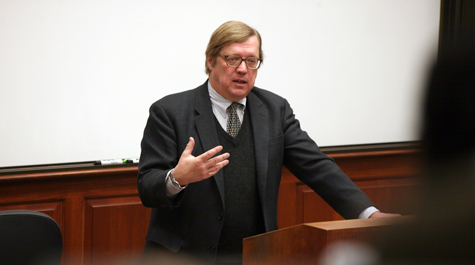UN Special Expert Reflects on International Justice in Cambodia
In a Feb. 25 speech delivered at William & Mary Law School, United Nations Special Expert David J. Scheffer used the upcoming 10th anniversary of the creation of the Extraordinary Chambers in the Courts of Cambodia to reflect on the tribunal's ongoing efforts to bring to justice the leaders responsible for the deaths of approximately 1.7 million Cambodians during the Pol Pot regime. Scheffer, who was the first U.S. Ambassador at Large for War Crimes Issues, has served since January 2012 as the U.N. Secretary-General's Special Expert on U.N. Assistance to the Khmer Rouge Trials. The Program in Comparative Legal Studies and Post-Conflict Peacebuilding, the Reves Center for International Studies, and the International Law Society hosted his visit to the Law School.
The text of Scheffer's speech, "What is 'Extraordinary' About International Justice in Cambodia," is available on the websites of the Cambodia Tribunal Monitor, U.N. Assistance to the Khmer Rouge Trials (UNAKRT), and the Extraordinary Chambers.
In his speech Scheffer described the creation of the Extraordinary Chambers, its jurisdiction, funding and expenses, and its engagement with the U.N. An overarching theme of his speech are the challenges inherent to a tribunal whose "investigations and trials ... are taking place decades after the atrocity crimes that ravaged Cambodia in the late 1970s." His talk highlighted some of the tribunal's "pioneering endeavors" and contributions to international criminal justice, and also addressed contentions of its critics. In a moving section of his speech, Scheffer noted the "unprecedented participation by the Cambodian people as spectators of the trials." More than 165,000 citizens, he said, have come to court to witness the proceedings in person. An additional 434,000 citizens have learned about the tribunal and its proceedings through town halls, video screenings, and other outreach programs.
At the conclusion of his speech, he observed: "The extensive jurisprudence of the Extraordinary Chambers demonstrates that international justice, and indeed a new era of Cambodian justice, is at work in Phnom Penh influencing not only the work of international and hybrid criminal tribunals, but also the domestic courts of Cambodia in the future."
In addition to his U.N. duties, Scheffer is the Mayer Brown/Robert A. Helman Professor at Northwestern University Law School, where he also serves as director of the Center for International Human Rights. He is the author of All the Missing Souls: A Personal History of the War Crimes Tribunals (Princeton University Press, 2012).
About William & Mary Law School
Thomas Jefferson founded William & Mary Law School in 1779 to train leaders for the new nation. Now in its third century, America's oldest law school continues its historic mission of educating citizen lawyers who are prepared both to lead and to serve.
